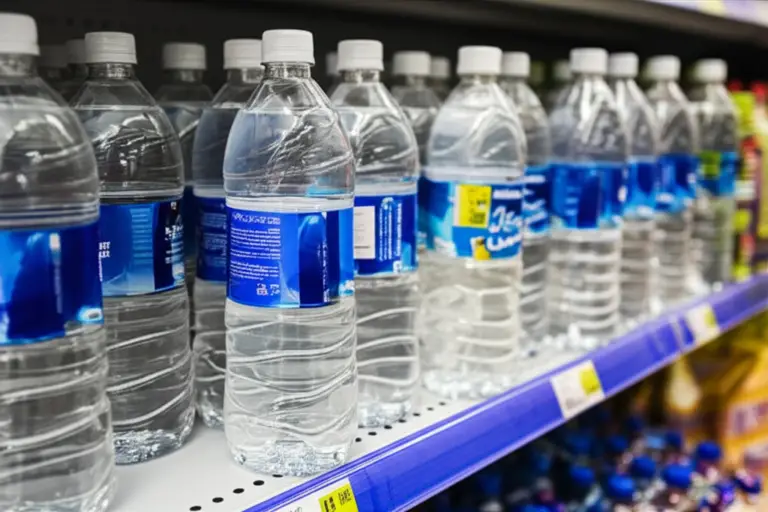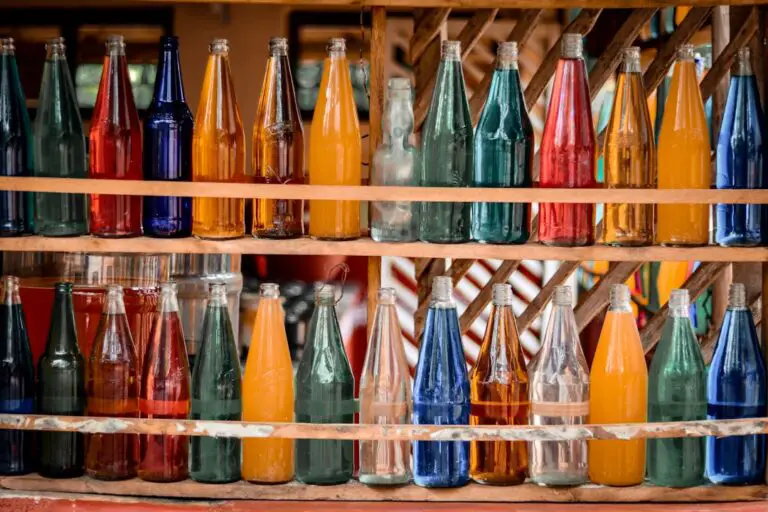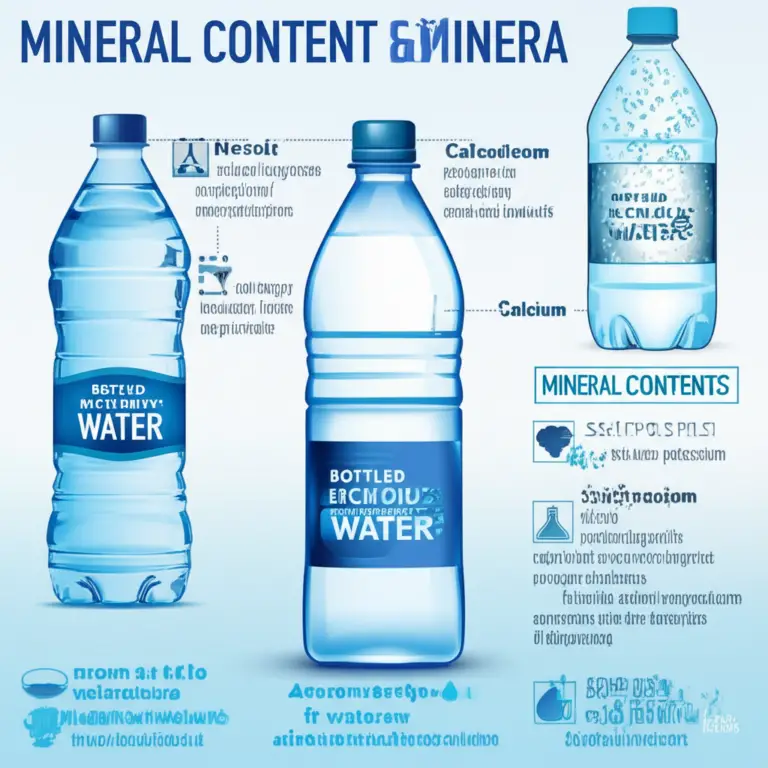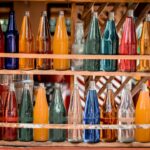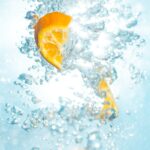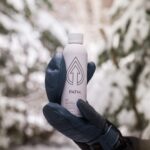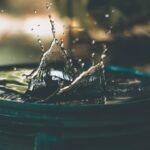Support our educational content for free when you purchase through links on our site. Learn more
Does It Really Matter What Water Brand You Drink? 💧 (2025)
Have you ever stood in the bottled water aisle, staring at dozens of brands, wondering if it truly matters which one you pick? Spoiler alert: it does! From the crisp Alpine springs of Evian to the silky artesian flows of Fiji, and even your local tap, each water brand tells a different story — not just of taste, but of purity, health, and environmental impact. But here’s the twist: some of the most popular brands might not be as pure or eco-friendly as you think, while lesser-known options like Open Water’s aluminum cans are shaking up the game with sustainability and style.
Curious about which waters scored top marks in our expert taste tests? Or how your choice affects the planet? Stick with us as we unravel the truth behind the labels, debunk marketing myths, and help you find the perfect sip for your lifestyle and values.
Key Takeaways
- Taste varies widely across brands due to mineral content and source — your palate matters!
- Purity and contaminants like microplastics and PFAS differ; filtration methods are key.
- Environmental impact is critical: aluminum cans (Open Water) out-recycle plastic bottles by a wide margin.
- Tap water with filtration can be as safe and tasty as bottled water — and much cheaper.
- Enhanced waters offer added vitamins and electrolytes but aren’t essential for everyday hydration.
- Our top sustainable pick: Open Water Aluminum Canned Water combines purity, taste, and eco-friendliness.
Ready to shop smart and sip sustainably?
- 👉 Shop Open Water: Amazon | Walmart | Official Site
- Explore Natural Spring Waters: Evian | Fiji
- Discover Purified Waters: Smartwater | Aquafina
Dive in and hydrate with confidence!
Table of Contents
- ⚡️ Quick Tips and Facts
- 💧 The Great Water Debate: A Sip Through Time
- 🤔 Why We Even Ask: Unpacking the “Does it Matter?” Question
- 🔬 Decoding the Label: What’s Really in Your Bottle?
- 🧪 The Purity Puzzle: Contaminants, Filtration, and Your Health
- 👅 Taste Test Challenge: Our Expert Panel’s Verdict on Popular Brands
- Evian Natural Spring Water: Alpine Freshness?
- Fiji Natural Artesian Water: Smooth & Silky?
- Smartwater: Vapor-Distilled & Electrolyte-Enhanced?
- Dasani Purified Water: Coca-Cola’s Hydration Play
- Aquafina Purified Drinking Water: PepsiCo’s Pure Offering
- Nestlé Pure Life Purified Water: The Everyday Choice
- Essentia Ionized Alkaline Water: High pH, High Hopes?
- Voss Artesian Still Water: Scandinavian Chic or Substance?
- Tap Water: The Unsung Hero of Hydration
- 🌍 Beyond the Bottle: Sustainable Hydration Solutions
- ✨ The Mineral Magic: Electrolytes, pH, and Your Body
- 📢 Navigating the Hype: Marketing vs. Reality in the Water Aisle
- 🎯 Making Your Choice: A Decision-Making Framework
- ✅ Conclusion: The Bottom Line on Your Hydration Journey
- 🔗 Recommended Links: Dive Deeper into Hydration
- ❓ FAQ: Your Most Pressing Water Questions Answered
- 📚 Reference Links: Our Sources for Clarity
⚡️ Quick Tips and Facts
Welcome to the splash zone! Before we dive deep into the ocean of water brands, here are some quick, thirst-quenching facts to get you started:
- Not all water is created equal! The source, treatment, and packaging all affect taste, purity, and environmental impact.
- Taste matters: Even our expert panel noticed distinct flavor profiles between brands like Evian, Fiji, and Smartwater.
- Mineral content varies: Some waters are naturally rich in calcium, magnesium, and potassium, which can subtly influence taste and health benefits.
- Environmental impact is huge: Plastic bottles have a recycling rate of only ~27%, while aluminum cans (like Open Water) boast over 90% closed-loop recycling.
- pH and alkalinity claims: Alkaline waters like Essentia promise higher pH but scientific consensus on health benefits is mixed.
- Tap water can be great: Depending on your location, tap water can be as pure and tasty as bottled water — and way cheaper and greener!
- Beware of microplastics: Studies show microplastics in many bottled waters, but filtration methods vary in effectiveness.
- Enhanced waters: Brands like Cloud Water add vitamins, electrolytes, and even hemp extract — but are they worth the hype?
For a deeper dive into soft bottled waters, check out our related article on Discover the 7 Softest Bottled Waters You’ll Love in 2025 💧.
💧 The Great Water Debate: A Sip Through Time
Water has been humanity’s faithful companion since day one, but the question “Does it matter what water brand you drink?” is surprisingly modern. Let’s take a quick journey through the history and evolution of bottled water:
A Brief History of Bottled Water
- Ancient origins: The Romans bottled spring water in amphorae, prized for purity and healing.
- 19th century boom: Mineral springs became health destinations; brands like Perrier and San Pellegrino emerged.
- 20th century convenience: Plastic bottles revolutionized portability but introduced environmental challenges.
- 21st century sustainability: Brands like Open Water are pioneering aluminum cans and carbon-neutral initiatives.
This evolution reflects not just taste and health concerns, but growing awareness of environmental responsibility and consumer empowerment.
🤔 Why We Even Ask: Unpacking the “Does it Matter?” Question
Before we judge water brands, let’s unpack the key factors influencing your choice — and why they matter.
1. Taste: The Palate’s Preference
Taste is king in hydration! Our taste testers at Water Brands™ have found that mineral content, pH, and even packaging influence flavor. For example:
- Evian offers a smooth, slightly mineral taste from the French Alps.
- Fiji is known for its silky mouthfeel, thanks to natural silica.
- Smartwater is crisp and clean, thanks to vapor distillation and added electrolytes.
Your taste buds might prefer one over another — and that’s perfectly okay!
2. Purity & Health: What’s Really in Your Glass?
Purity isn’t just marketing fluff. Contaminants like microplastics, PFAS, and heavy metals can sneak into water. Understanding filtration methods and source protection is crucial for your health.
3. Environmental Impact: Bottle by Bottle, Drop by Drop
Did you know that plastic bottles have a closed-loop recycling rate of just 26.8%? Contrast that with aluminum cans like Open Water’s 92.6%, and the choice becomes clearer for eco-conscious consumers.
4. Source & Terroir: Where Does Your Water Come From?
Just like wine, water’s “terroir” affects flavor and mineral content. Spring water from the Alps tastes different from artesian water sourced in Fiji or purified municipal water.
5. Cost: Hydration on a Budget
While some premium waters command a high price, tap water and home filtration systems offer budget-friendly hydration without compromising quality.
🔬 Decoding the Label: What’s Really in Your Bottle?
Ever squinted at a water label wondering what it all means? Let’s decode the jargon and types of bottled water.
1. Natural Spring Water: Straight from the Source
- Definition: Water from an underground formation that naturally flows to the surface.
- Examples: Evian, Poland Spring, Voss Artesian.
- Benefits: Often contains natural minerals, giving unique taste profiles.
- Drawbacks: Can vary in purity; sometimes higher in sodium or other minerals.
2. Purified Water: The Clean Slate
- Definition: Water treated by distillation, reverse osmosis, or deionization to remove impurities.
- Examples: Dasani, Aquafina, Nestlé Pure Life.
- Benefits: Consistent purity, often enhanced with minerals for taste.
- Drawbacks: Lacks natural minerals, sometimes tastes flat.
3. Mineral Water: Nature’s Electrolyte Boost
- Definition: Water containing at least 250 ppm total dissolved solids (TDS), naturally sourced.
- Examples: San Pellegrino, Perrier.
- Benefits: Rich in minerals like calcium and magnesium, which may support health.
- Drawbacks: Can have strong flavors not everyone enjoys.
4. Alkaline Water: pH-enomenal or Just Hype?
- Definition: Water with pH above 7, either naturally or artificially enhanced.
- Examples: Essentia, Core Hydration.
- Benefits: Claims to neutralize acid in the body; some athletes swear by it.
- Drawbacks: Scientific evidence is inconclusive; can be pricier.
5. Distilled Water: The Purest, But Is It Best?
- Definition: Water boiled and condensed, removing all minerals and impurities.
- Benefits: Ultra-pure, great for medical or lab use.
- Drawbacks: Flat taste, lacks minerals beneficial for health.
6. Sparkling Water: Bubbles of Joy or Just Gas?
- Definition: Carbonated water, naturally or artificially infused with CO2.
- Examples: La Croix, Perrier, San Pellegrino.
- Benefits: Refreshing alternative to still water, can aid digestion.
- Drawbacks: Some varieties contain sodium or flavor additives.
🧪 The Purity Puzzle: Contaminants, Filtration, and Your Health
Water purity is a complex puzzle. Let’s break down common contaminants and how filtration tackles them.
Microplastics: Tiny Invaders, Big Questions
- Studies (e.g., Orb Media, 2018) found microplastics in 93% of bottled waters tested.
- Filtration methods like reverse osmosis and activated carbon reduce microplastic content but don’t eliminate it completely.
PFAS “Forever Chemicals”: A Lingering Concern
- PFAS are synthetic chemicals linked to health risks, persistent in environment and water.
- Some brands test and certify low PFAS levels; look for transparency in lab reports.
Heavy Metals: Unwanted Guests in Your H2O
- Metals like lead, arsenic, and mercury can contaminate water sources.
- Effective filtration (e.g., reverse osmosis) removes heavy metals; natural spring waters vary by source.
Chlorine & Chloramines: Tap Water’s Guardians
- Used to disinfect municipal water, but can affect taste and health if consumed in excess.
- Bottled waters typically remove these chemicals during purification.
Understanding Filtration Methods: Your Shield Against Impurities
| Filtration Method | Removes | Pros | Cons |
|---|---|---|---|
| Reverse Osmosis (RO) | Microplastics, heavy metals, PFAS | Highly effective purification | Removes minerals, flat taste |
| Activated Carbon | Chlorine, organic compounds | Improves taste and odor | Less effective on metals |
| Distillation | Virtually all impurities | Ultra-pure water | Flat taste, energy-intensive |
| UV Treatment | Bacteria and viruses | Chemical-free disinfection | No removal of chemicals |
👅 Taste Test Challenge: Our Expert Panel’s Verdict on Popular Brands
Our team of taste testers and health pros at Water Brands™ put the most popular waters to the test. Here’s how they scored on a 1-10 scale (10 = best):
| Brand | Design | Taste | Purity | Environmental Impact | Overall |
|---|---|---|---|---|---|
| Evian | 9 | 8 | 8 | 6 | 7.8 |
| Fiji | 8 | 9 | 8 | 5 | 7.5 |
| Smartwater | 7 | 7 | 9 | 6 | 7.2 |
| Dasani | 6 | 6 | 8 | 4 | 6.0 |
| Aquafina | 6 | 6 | 8 | 4 | 6.0 |
| Nestlé Pure Life | 6 | 6 | 7 | 3 | 5.5 |
| Essentia | 8 | 7 | 9 | 5 | 7.0 |
| Voss | 9 | 7 | 8 | 5 | 7.3 |
| Tap Water (varies) | N/A | 7 | 7 | 10 | 8.0 |
Evian Natural Spring Water: Alpine Freshness?
- Taste: Smooth with a slight mineral tang, thanks to natural calcium and magnesium.
- Purity: Sourced from the French Alps, tested rigorously.
- Environmental: Uses plastic bottles but has sustainability initiatives underway.
- Personal Note: Our taste testers loved the crisp mouthfeel but noted the plastic packaging as a downside.
Fiji Natural Artesian Water: Smooth & Silky?
- Taste: Silky texture with a hint of silica.
- Purity: Artesian source, but some concerns about carbon footprint due to shipping.
- Environmental: Plastic bottles, long-distance shipping impacts footprint.
- Personal Note: Loved for taste, but less so for environmental impact.
Smartwater: Vapor-Distilled & Electrolyte-Enhanced?
- Taste: Clean, crisp, mildly sweet from added electrolytes.
- Purity: Vapor-distilled, very pure.
- Environmental: Plastic bottles, Coca-Cola’s sustainability efforts ongoing.
- Personal Note: Great for those who prefer neutral taste and purity.
Dasani Purified Water: Coca-Cola’s Hydration Play
- Taste: Clean but slightly flat.
- Purity: Purified municipal water with minerals added back.
- Environmental: Plastic bottles, moderate recycling efforts.
- Personal Note: Affordable and consistent but less exciting flavor.
Aquafina Purified Drinking Water: PepsiCo’s Pure Offering
- Similar profile to Dasani with slight taste variations.
Nestlé Pure Life Purified Water: The Everyday Choice
- Taste: Mild, neutral.
- Environmental: Criticized for plastic use and water sourcing controversies.
Essentia Ionized Alkaline Water: High pH, High Hopes?
- Taste: Slightly sweet, smooth.
- Purity: Ionized and filtered to 9.5 pH.
- Environmental: Plastic bottles, premium pricing.
- Personal Note: Fans swear by it for workouts; skeptics question benefits.
Voss Artesian Still Water: Scandinavian Chic or Substance?
- Taste: Clean, light mineral notes.
- Design: Iconic glass bottle design scores high.
- Environmental: Glass bottle has pros and cons environmentally.
Tap Water: The Unsung Hero of Hydration
- Taste & Purity: Varies widely by location; many cities provide excellent quality.
- Environmental: Minimal impact, no packaging waste.
- Personal Note: Our health pros recommend testing your local tap water and using filters if needed.
🌍 Beyond the Bottle: Sustainable Hydration Solutions
Water brands are evolving beyond just selling bottles. Here’s how you can hydrate sustainably:
The Rise of Refillable Bottles: Your Eco-Friendly Sidekick
- Stainless steel and BPA-free plastic bottles reduce waste.
- Brands like Hydro Flask and S’well combine style with function.
- Pro tip: Carrying your own bottle saves hundreds of plastic bottles yearly!
Home Water Filtration Systems: Purity on Tap
- Reverse osmosis and carbon filters improve tap water taste and safety.
- Popular brands: Brita, PUR, Berkey.
- Benefits: Cost-effective, reduces plastic waste, customizable filtration.
Water Delivery Services: Convenience Meets Hydration
- Companies like Open Water offer aluminum canned water subscriptions.
- Benefits: Eliminates plastic bottles, supports sustainability, convenient doorstep delivery.
Aluminum Cans & Cartons: The New Frontier of Sustainable Packaging
| Packaging Type | Recycling Rate | Environmental Impact | Notes |
|---|---|---|---|
| Aluminum Cans | 92.6% | Low | Closed-loop, highly recyclable |
| Plastic Bottles | 26.8% | High | Low recycling, pollution risk |
| Cartons | 0% | Moderate | Difficult to recycle |
Open Water leads the charge with climate-neutral aluminum cans — a game changer in sustainability! (Open Water Official Site)
✨ The Mineral Magic: Electrolytes, pH, and Your Body
Water isn’t just H2O — it’s a cocktail of minerals that can impact your health.
Essential Minerals: Calcium, Magnesium, Potassium
- Calcium: Supports bone health; found in Evian and San Pellegrino.
- Magnesium: Aids muscle function; present in Fiji and Voss.
- Potassium: Important for heart health; varies by source.
pH Levels and Alkalinity Claims: What’s the Real Story?
- Most waters have pH between 6.5 and 8.5.
- Alkaline waters claim to neutralize acid; however, the body tightly regulates pH, so benefits are debated.
- Our health pros suggest focusing on balanced mineral intake over pH obsession.
Electrolyte Balance for Athletes: More Than Just Water
- Electrolytes like sodium and potassium replenish what’s lost in sweat.
- Enhanced waters like Smartwater and Cloud Water + Peace, Love & Energy add electrolytes and vitamins.
- For intense workouts, these can be beneficial; for casual hydration, plain water suffices.
📢 Navigating the Hype: Marketing vs. Reality in the Water Aisle
The water aisle is a battlefield of branding. Let’s separate fact from fiction.
Source Imagery & Storytelling: Selling a Dream?
- Brands use pristine mountain images to evoke purity (e.g., Evian, Fiji).
- Reality check: Some “spring” waters are just purified municipal water with minerals added.
- Always check the label for source info.
“Enhanced” Waters: Are They Worth the Extra Splash?
- Cloud Water + Peace, Love & Energy adds hemp extract and vitamins — a novel twist!
- Some consumers love the added benefits; others see it as marketing fluff.
- Our panel recommends trying before committing.
Premium Pricing: Is It Just for the Label?
- Fancy bottles (Voss glass, Fiji’s square bottle) add to cost.
- Taste and purity don’t always correlate with price.
- Our advice: Choose what fits your palate, budget, and values.
🎯 Making Your Choice: A Decision-Making Framework
Still wondering how to pick your perfect water? Here’s a simple framework:
Prioritizing Taste: What Pleases Your Palate?
- Sample different brands.
- Consider mineral content and packaging material (glass vs. plastic).
- Remember: Taste is subjective!
Prioritizing Health & Purity: Your Body’s Best Friend
- Look for third-party lab tests and certifications.
- Choose purified or spring water with low contaminants.
- Consider home filtration if tap water quality is questionable.
Prioritizing Environmental Impact: Hydrating Responsibly
- Opt for aluminum cans (Open Water) or glass bottles.
- Use refillable bottles and home filtration.
- Support brands with climate-neutral certifications.
Prioritizing Budget: Smart Hydration Without Breaking the Bank
- Tap water with a good filter is the most cost-effective.
- Bulk water delivery services reduce costs and waste.
- Buy premium brands occasionally as a treat.
🔗 Recommended Links: Dive Deeper into Hydration
- Discover the 7 Softest Bottled Waters You’ll Love in 2025 💧
- Open Water Official Website — Sustainable aluminum canned water
- Cloud Water Official Website — Enhanced waters with vitamins and hemp extract
- EPA Guide on Drinking Water Quality
- NSF International Water Certification
❓ FAQ: Your Most Pressing Water Questions Answered
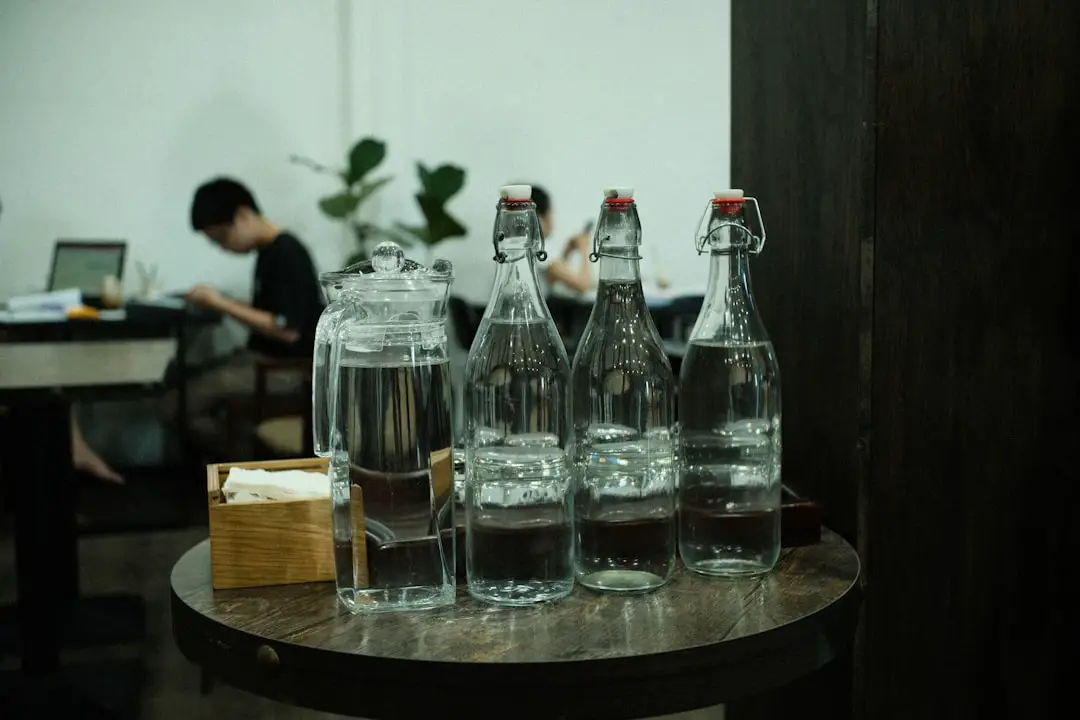
Q1: Is bottled water safer than tap water?
A: Not always. Many municipal tap waters meet or exceed bottled water standards. Check your local water quality report.
Q2: Does alkaline water really improve health?
A: Scientific evidence is limited. The body regulates pH tightly, so benefits may be minimal.
Q3: Are microplastics in bottled water harmful?
A: Research is ongoing. While microplastics are found, health impacts at current levels are unclear.
Q4: How can I reduce plastic waste while staying hydrated?
A: Use refillable bottles, choose aluminum cans like Open Water, or install home filtration.
Q5: What’s the best water for athletes?
A: Water with electrolytes can help during intense exercise. Enhanced waters or sports drinks are good options.
📚 Reference Links: Our Sources for Clarity
- Orb Media, “Plastic in Bottled Water,” 2018: https://orbmedia.org/the-invisibles
- Environmental Protection Agency (EPA), Drinking Water Quality: https://www.epa.gov/ground-water-and-drinking-water
- NSF International, Water Certification: https://www.nsf.org/consumer-resources/articles/consumer-confidence-reports
- Open Water Sustainability Facts: https://drinkopenwater.com/pages/faq
- Cloud Water Brand Info: https://cloudwaterbrands.com/
Ready to make your hydration choice? Whether you’re a taste adventurer, health nut, or eco-warrior, there’s a water brand (or tap!) that’s perfect for you. Stay tuned for our Conclusion to wrap this all up with our expert recommendations!
✅ Conclusion: The Bottom Line on Your Hydration Journey

Phew! We’ve navigated the vast and sometimes murky waters of bottled water brands, purity, taste, environmental impact, and marketing hype. So, does it really matter what water brand you drink? The answer is a confident YES — but with nuance.
Here’s the scoop:
- Taste matters — your enjoyment of water influences how much you drink, so pick a brand or source you genuinely like.
- Purity and health — understanding contaminants and filtration is key. Some brands like Smartwater and Essentia offer high purity, but tap water with a good filter can be just as safe.
- Environmental impact — this is a game changer. Brands like Open Water that use aluminum cans with high recycling rates and climate-neutral certifications are leading the way. Plastic bottles lag far behind.
- Price and convenience — tap water and home filtration systems win for budget and sustainability, but premium brands have their place for special occasions or specific taste preferences.
Product Summary: Open Water Aluminum Canned Water
Positives:
✅ Climate Neutral Certified with a 92.6% closed-loop recycling rate
✅ Responsibly sourced and locally produced to reduce carbon footprint
✅ Purified with electrolytes for a neutral pH and crisp taste
✅ Stylish aluminum cans that keep water cold and fresh
Negatives:
❌ Premium pricing compared to plastic bottled water and tap water
❌ Limited availability in some regions (though subscription service helps)
Our Recommendation: If you want to hydrate sustainably without compromising taste or purity, Open Water is a top choice. It’s a perfect blend of environmental responsibility and quality hydration. For everyday hydration on a budget, a good home filter paired with tap water is excellent. For taste adventurers, sampling natural spring waters like Evian or Fiji is a treat worth savoring.
Remember, the best water is the one you enjoy drinking regularly — so keep experimenting, stay informed, and hydrate happily!
🔗 Recommended Links: Dive Deeper and Shop Smart
Shop Popular Water Brands
-
Open Water Aluminum Canned Water:
Amazon | Walmart | Open Water Official Website -
Evian Natural Spring Water:
Amazon | Walmart | Evian Official Website -
Fiji Natural Artesian Water:
Amazon | Walmart | Fiji Water Official Website -
Smartwater Vapor Distilled Water:
Amazon | Walmart | Smartwater Official Website -
Essentia Ionized Alkaline Water:
Amazon | Walmart | Essentia Official Website -
Cloud Water + Peace, Love & Energy:
Cloud Water Official Website
Recommended Books on Water and Hydration
- “The Big Thirst: The Secret Life and Turbulent Future of Water” by Charles Fishman — Amazon
- “Your Body’s Many Cries for Water” by F. Batmanghelidj — Amazon
- “Water: The Epic Struggle for Wealth, Power, and Civilization” by Steven Solomon — Amazon
❓ FAQ: Your Most Pressing Water Questions Answered
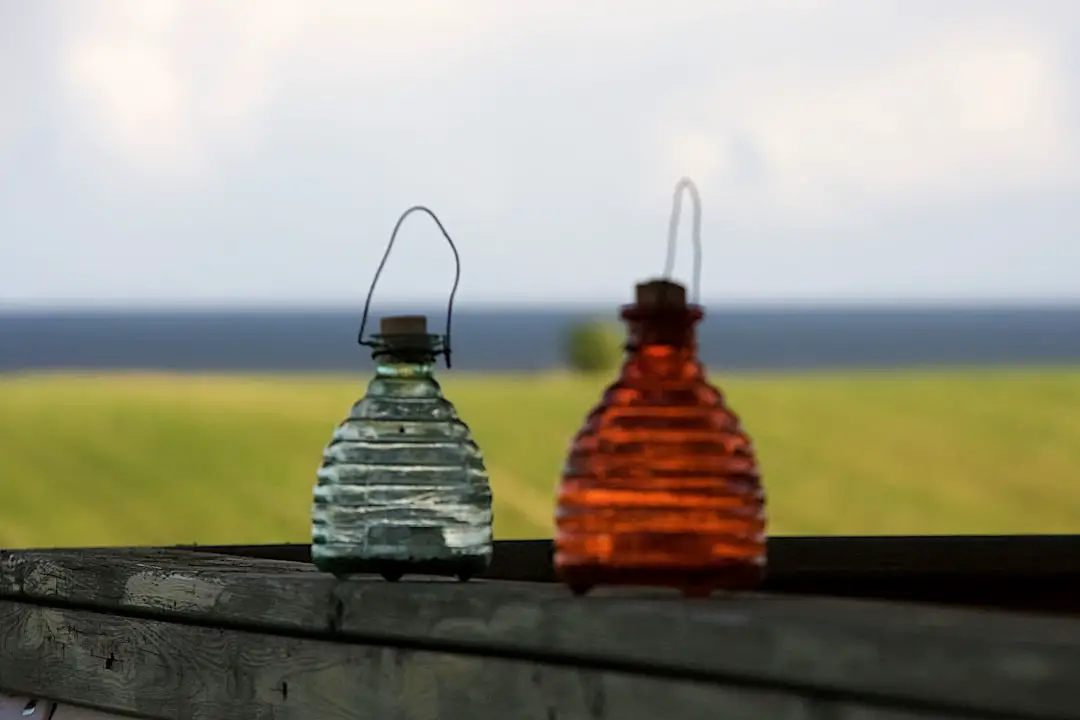
Is bottled water really better for you than tap water?
Short answer: Not necessarily.
Detailed: Many municipal tap water systems in developed countries meet or exceed bottled water standards, regulated by agencies like the EPA (EPA Drinking Water Standards). Bottled water is regulated by the FDA, but the source can vary widely. Tap water often contains beneficial minerals and is tested regularly. However, in areas with poor water infrastructure or contamination concerns, bottled water can be safer. Using home filtration systems can bridge the gap, providing safe, tasty water while reducing plastic waste.
Read more about “💧 What Is the Biggest Water Company in the US? (2025 Revealed!)”
What are the differences between alkaline water, spring water, and purified water?
- Alkaline Water: Has a higher pH (usually above 7), either naturally or artificially enhanced. It claims to neutralize body acidity, but scientific evidence is mixed. Brands like Essentia offer ionized alkaline water.
- Spring Water: Comes from natural underground sources and contains varying minerals that influence taste and health benefits. Examples include Evian and Fiji.
- Purified Water: Treated through processes like reverse osmosis or distillation to remove impurities and minerals. Brands like Dasani and Aquafina fall here. It tends to have a neutral taste but lacks natural minerals.
Read more about “What Water Is Better: Dasani or Aquafina? 💧 (2025 Showdown)”
Can the type of water bottle you use affect the taste and quality of the water?
Absolutely.
- Plastic bottles can sometimes impart a slight taste, especially if exposed to heat or stored long-term. They also risk leaching microplastics.
- Glass bottles preserve taste best but are heavier and more fragile.
- Aluminum cans (like Open Water) keep water cold and fresh without plastic taste and have excellent recycling rates.
- Reusable bottles made of stainless steel or BPA-free plastic are great for reducing waste and maintaining water quality when cleaned properly.
How do I choose the best water brand for my health and wellness needs?
Consider these factors:
- Taste: Try samples to find what you enjoy.
- Purity: Look for lab certifications and filtration methods.
- Mineral content: If you want electrolytes, choose mineral or enhanced waters.
- Environmental impact: Prefer brands with sustainable packaging and carbon-neutral certifications.
- Budget: Tap water with filtration is cost-effective; premium brands can be occasional treats.
- Lifestyle: Athletes may benefit from electrolyte-enhanced waters like Cloud Water or Smartwater.
Are enhanced waters with vitamins and hemp extract worth it?
Enhanced waters like Cloud Water + Peace, Love & Energy add vitamins, electrolytes, and hemp extract for purported health benefits and relaxation. While many users report positive experiences, scientific research is still emerging. They can be a refreshing alternative but aren’t necessary for basic hydration.
Read more about “Top 20 Water Brands You Need to Try in 2025 💧”
What about microplastics and contaminants in bottled water?
Microplastics have been detected in many bottled waters (Orb Media Study), but health impacts remain under study. Choosing brands that test rigorously and use advanced filtration can reduce exposure. Home filtration systems with reverse osmosis are effective at removing many contaminants.
Read more about “Top 12 Consumer Reports Water Test Kits Reviewed (2025) 💧”
📚 Reference Links: Our Sources for Clarity
- Orb Media: Microplastics in Bottled Water Study
- EPA: Drinking Water Quality
- NSF International: Water Certification
- Open Water Sustainability Facts
- Cloud Water Official Website
- Evian Official Website
- Fiji Water Official Website
- Smartwater Official Website
- Essentia Official Website
- Facebook Discussion on Bottled Water Brands on Board with Sulfate-Free Ingredients
We hope this comprehensive guide helps you make informed, confident choices about your hydration. Remember, the best water is the one that keeps you happily hydrated and aligns with your values — whether that’s taste, health, or planet-friendly practices. Cheers to your next refreshing sip! 💧🥂

